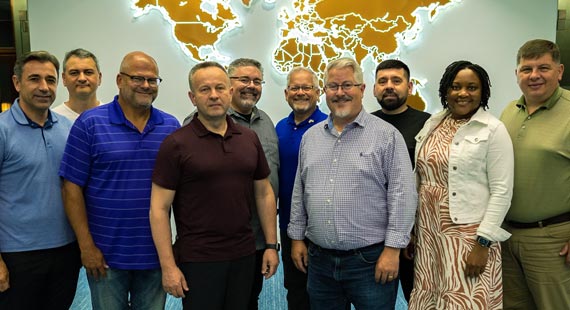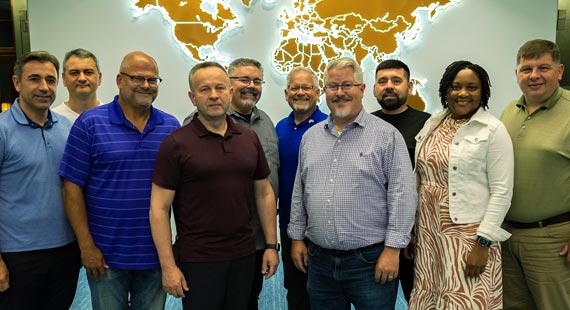“We consider ourselves dead…and commit ourselves to the One who raises the dead.” These were some of the first words in a conversation with Igor Bandura, senior vice president of the Baptist Union of Ukraine.
His words came in response to an inquiry from Converge North Central regional president Mark Bjorlo, who asked, “So, how are you all doing, in light of the past five months of war?” Bandura quickly followed with another insight from the Apostle Paul: “For it has been granted to us on behalf of Christ not only to believe in him, but also to suffer for him…” (Phil. 1:29).
This exchange occurred in the opening moments of the Baptist Union of Ukraine (BUU) and Converge Leadership Summit, held in Lviv, Ukraine, August 2-3. The summit included representatives from the BUU, Converge and St. Paul, Minnesota-based Potential Endeavors.

Referring to the 30-year history of Converge ministry in Ukraine, BUU president Valery Antonyuk remarked that Converge was one of the first organizations to respond to the war in Ukraine.
“I had to do a little research and soon realized that Converge was an old friend, but with a new name,” he said of the partnership dating back to Converge’s days as the Baptist General Conference.
Since the end of February, Converge has raised and distributed $900,000 in aid to the church in Ukraine and refugee ministries in surrounding nations.
“Only God knows how much you have helped the church here,” Antonyuk said.
The war’s lasting and damaging effects hit home
Before Russia invaded Ukraine, the BUU offices were in the Kyiv suburb of Irpin, and the five leaders who attended the summit lived there or in Bucha, a neighboring suburb. Irpin and Bucha became the first sites of the war’s destructive and unspeakably cruel abuses that have continued to this day.
The men said that the first indication of the Russian invasion was not the explosions of bombs in Kyiv but reports from their neighbors that paratroopers were landing all over their cities. Their cities became the center of the battle for Kyiv and were the sight of missile, artillery and infantry battles. Mass executions of civilian men, women and children took place. Thousands more were physically and sexually abused. Russian troops often occupied homes left standing before stripping everything from them in their subsequent withdrawal.
BUU executive secretary Volodymyr Condor shared a photo of his apartment building that revealed the building’s blackened and shattered top three floors, decimated by a missile strike. His apartment on the bottom floor was damaged but intact. It was, however, occupied by Russian troops during the siege and vandalized.
The BUU’s leaders quickly moved their offices and families to the Theological Seminary in Lviv, just an hour from the Polish border, away from the focus of the Russian attack. They became part of the 11 million Ukrainians displaced by the war. Four million fled to Western nations across Europe and beyond. Another 7 million stayed within Ukraine but fled to the western part of the country.
Responding to Ukraine’s needs ― today and tomorrow
The summit discussions focused on meeting immediate needs and looking to the future. Today in Ukraine, the need is great. The response of the church has been compassionate and consistent. As a result, thousands of people have turned to Jesus and been baptized as believers as they experienced the loving care of God’s people.
Church buildings that serve as shelters for displaced people are also the site of daily prayer and worship services, the crowds so large that many have to stand in the aisles or against the walls. Most of those attending are new to the church.
Participants discussed future church planting, church strengthening and global outreach efforts at length. The BUU estimates that they need 1000 pastors to fill their current needs. They had a goal before the war to plant 100 new churches after starting 40 in the previous two years and had planned for 30 church plants this year. With the war and the closure or destruction of hundreds of churches, the need has grown exponentially ― and so has their commitment.
How you can help
As the news cycle moves on to other headlines and our attention moves to our financial troubles with rising prices and limited supplies, our giving has nearly stopped. At the same time, millions of displaced Ukrainians living in temporary housing units will soon face a bitterly cold winter without heat or adequate clothing. I challenge you to consider the words of Christ, and sacrificially give water, food, clothing, shelter and medical care to “the least of these my brethren” in Ukraine. It’s what we do as God’s people!
“The writer of Hebrews says, ‘In your struggle against sin you have not yet resisted to the point of shedding your blood,’ Converge Heartland regional president Jim Capaldo said after the summit. “This week, I realized that I was with people who had indeed faced evil and experienced bloodshed. I felt unworthy to be in the same room with them.”
The other members of Converge’s team nodded in agreement, voiced prayers for their brothers and sisters and committed to continued partnership with them in their struggle.
Converge has established a relief fund to provide relief for gospel leaders, others who remain within the Ukrainian borders and people who are displaced. Please donate today. There will be no service fee for donations to this fund.
